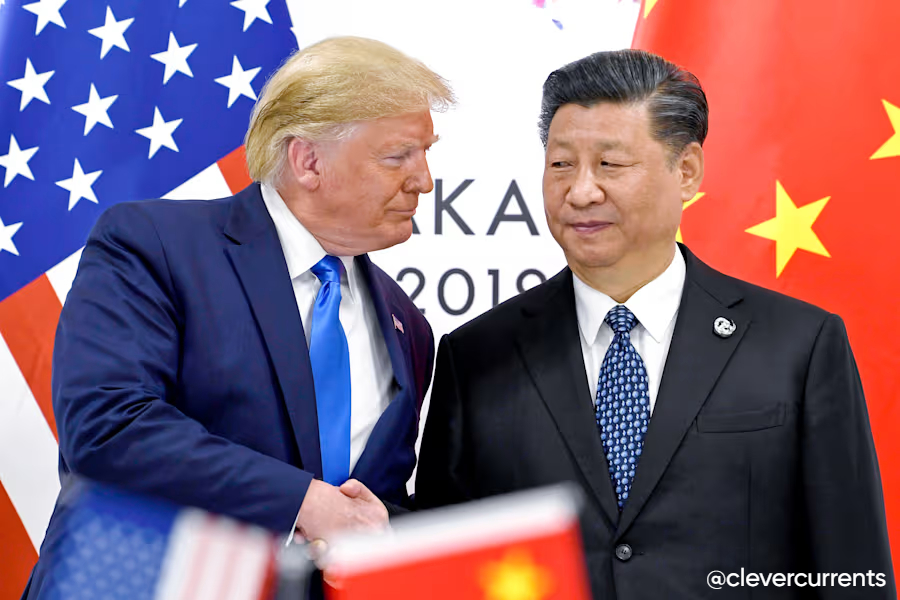When former President Donald Trump launched his campaign to “Make America Great Again,” few would have predicted that one of his signature policies would inadvertently accelerate China’s technological ascendancy. Yet that’s precisely what happened with his crackdown on the H-1B visa program — a policy maneuver that now looks less like nationalist strength and more like strategic self-sabotage. A harakiri, if you will — and China, watching closely, didn’t hesitate to seize the moment.
The H-1B Clampdown: Nationalism vs. Necessity
The H-1B visa program was designed to allow U.S. companies to hire skilled foreign workers in specialized fields, particularly in STEM. Over the years, it became a magnet for global talent — especially from India — fueling the growth of Silicon Valley and keeping America at the forefront of innovation.
Trump, however, saw it differently. His administration viewed the H-1B system as a loophole exploited to undercut American workers. By tightening eligibility, increasing scrutiny, and suspending fast-track processing, Trump effectively made the U.S. a less attractive destination for the world’s brightest minds. The message was loud and clear: “We don’t want you.”
Brain Drain Becomes Brain Gain — For China
Meanwhile, China — long dismissed as a copycat economy — was evolving. With strategic investments in AI, quantum computing, biotech, and semiconductors, China was positioning itself as a tech superpower. When the U.S. shut its doors to skilled immigrants, China rolled out the red carpet.
Many highly educated engineers and scientists, particularly from India, began to look eastward. China’s tech giants like Huawei, Tencent, and ByteDance, flush with state support and hungry for global expertise, welcomed them. Beijing even launched aggressive talent acquisition programs like the Thousand Talents Plan, offering top-tier foreign researchers generous salaries, labs, and permanent residency.
In essence, Trump’s immigration hawkishness created an exodus of talent — and China was more than happy to catch what fell through America’s fingers.
Tech Cold War: Unintended Outcomes
In the context of the emerging tech cold war, this shift carries long-term strategic consequences. The U.S. has always relied on immigration to maintain its edge. Its tech sector, from Google to Tesla, is littered with the fingerprints of immigrants. Undermining this advantage in the name of economic nationalism was a short-sighted move.
The U.S. tried to kneecap Huawei, restrict chip exports, and push back against Chinese influence in global tech — but at the same time, it handicapped its own ability to replenish the very workforce needed to stay ahead.
China, sensing the geopolitical winds, doubled down on self-reliance. Trump’s policies, ironically, accelerated China’s push toward indigenous innovation. It forced Chinese firms to develop alternatives to U.S. technologies, while quietly building a pipeline of global talent America was too proud to keep.
America’s Self-Inflicted Wound
Trump’s H-1B policy wasn’t just an immigration issue — it was a strategic blunder. While framed as protectionist and populist, it ignored a basic economic reality: innovation doesn’t care about borders, but it thrives where it’s welcomed. The U.S. had long been that place. But the Trump-era clampdown turned a faucet into a bottleneck.
The irony? The very workers Trump sought to keep out weren’t displacing American jobs — they were creating entire industries and boosting competitiveness. By halting the flow, the U.S. didn’t protect jobs. It just exported opportunity.
Where Things Stand Now
The Biden administration reversed many of Trump’s immigration policies, but the damage was done. Trust was eroded. Many high-skilled workers, once eager to build their lives in the U.S., recalibrated their ambitions. Countries like Canada, Australia, and yes — China — became viable alternatives.
America’s brand as the land of opportunity took a hit, while China sharpened its appeal as a rising innovation hub.
Conclusion: A Cautionary Tale in Geopolitical Strategy
In a global economy, talent is the most valuable currency. Trump’s H-1B restrictions were a self-inflicted wound — a harakiri disguised as patriotism. And while the U.S. bled competitiveness, China picked up the knife and carved out a bigger piece of the future.
Once again, in the chaos of American politics, China found its opening — and took it.

